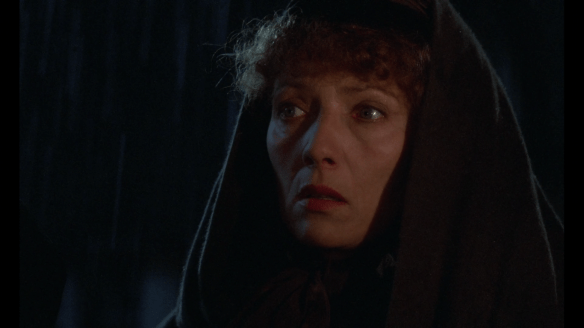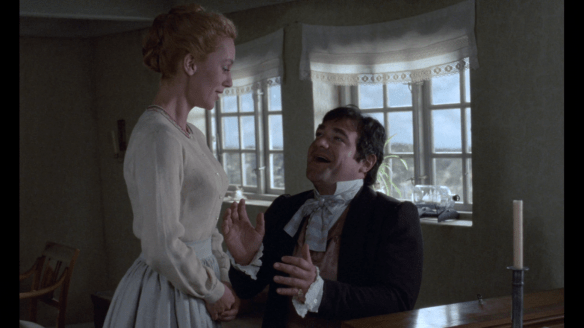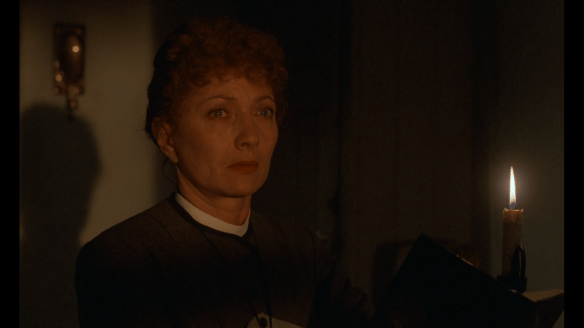I love fairy tales where we know conspicuously that we are being told a story. They can be delivered by Peter Falk in The Princess Bride, Edward Everett Horton in Fractured Fair Tales, or in this case, Ghita Norby.
Let it be said that there’s something inherently peaceful about the rhythms of Babette’s Feast. We meet two sisters devoted to simple acts of charity and good works generally living a simple life of tranquility.
Years prior they grew up on the right and left hand of their father, who was a local preacher, beloved by all in their little community of thatched roofs and decent folk. They are a world away from French courtesans and the social elite of the age. In this regard, the movie’s set design runs the gamut from a puritan-like asceticism to ornate interiors worthy of 19-century royalty. One of these outsiders is a young soldier (Gudmar Wivesson).
Riding upon his steed, he’s taken by one of the daughters, Martine, so angelic with golden hair and scintillating eyes. He’s never seen someone so glorious. And so he joins their little commune, all gathered around the table. Yet he is not made for their life and so he takes his leave to return to the world he knows — a world less harsh and cruel to the senses. His friends tease him for being defeated by some long-faced sectarians, but if it is a defeat, then it is one that stays with him.
He is not the only one. The Jutlands conquers others too… Next arrives an exuberant barrel-chested French baritone. He’s revered and fawned over by all the literati (including Bibi Andersson), but it is in this little town where he finds someone who makes his heart sing. It’s the minister’s other daughter Filippa.
The jovial Achille Papin (Jean-Philippe Lafont) requests the honor to help train up the young lady and refine her vocal talents. It’s hardly a pretense as his tutelage is inspired and brimming with impassioned vigor. It’s contagious. But he too fades away. The devoted daughter recognizes her father would never approve of anything further.
And so years passed, their father died, and the two women, still unmarried, shepherd and care for their local parish. We can make allowances — time progresses and is condensed so easily because, again, we are working within the parameters of a kind of parable or fairy tale.
Intuitively it becomes a kind of rumination on aging and what that means — not just for to pious spinsters — but also how our joys and the manner in which we conduct our days become affected. Are they injected with renewed vigor or the kind of enervating melancholy that builds up almost imperceptibly so we just come to accept eour plight with passivity?
The population of their community is aging as well, and with it comes a schism of bickering and discord within the ranks of the disciples. The sisters look on with wide-eyed bewilderment. Surely this is not what they worked so hard to cultivate in their father’s absence.
However, the sisters also gained a housekeeper in the form of Babette, a French woman seeking asylum and recommended at the behest of an old friend. Stephane Audran is starkly different than my memories of her in Claude Chabrol’s work or the representation of vacuity of the Discreet Charm of the Bourgeoisie. Here she is a saint gifted with a hand for cooking and a generous heart. She can be a blessing to these people.
It takes some time to recognize what the film is doing — what magic spell it’s casting. The sisters have a meager vision of cobbling together a modest supper to commemorate the 100th anniversary of their little congregation’s founder, but Babette requests to throw a banquet. She’s set on the idea so the sisters acquiesce.
The whole town is agog when her procession of goods comes imported from France: qual, turtle, and wine of all things! They are wary of being exposed to potentially dangerous forces in the form of such decadent food and drink, and so they form a pact with their small clan to not speak a word about these provisions.
It also strikes one as a tactic to avoid any unwanted gossip because suddenly it becomes another arena for “good Christian virtue” to play out. They are too blind to see an alabaster jar of perfume being poured out on the feet of a guest. In other words, they are out of step with the moment. It’s not hard to detect Biblical underpinnings.
Babette’s Feast is somehow a movie drenched in the rhetoric and messages of Ecclesiastes. A graying soldier (Jarl Kulle), who we know must be vaguely familiar, looks into a mirror solemnly and says, “Vanity, vanity, all is vanity.” It puts words to a life spent striving after things all for naught.
It’s also easy to conjure up the words “Eat drink and be merry for tomorrow we die!” The parishioners don’t live in this manner, and yet if this picture’s ending is any indication maybe a certain amount of uninhibited joy is a balm and not simply a cursed reminder of how transient and finite our lives are. Could it be, if we flip the paradigm, that a feast is not simply a coping tactic, a way to muddle through this life, but it’s actually a sign or a foretaste of something better?
This act of radical extravagance at the hands of Babette is not to be taken only in a literal sense. It’s not a moral prerogative about how to spend one’s funds, but this parable points to something else of vital importance. Because the table setting is so foreign to these folks — it’s so ornate — the food equally rich and extravagant.
Is it a waste — such rich food lavished on people who don’t appreciate it? These are my immediate reactions. I’m no foodie, but this is not the point. For Babbette, it is an act of love, and to have even one person — the general — appreciate her toilings is reward enough.
The look of incredulousness and utter admiration for each new course and subsequent drink is something to relish. His face lights up like it hasn’t for a long, long time. Can I state the obvious and say it is a joy to watch these people eat — living vicariously through the experience set before them? And something contagious comes over all of us (audience included). The meal seems to have powers beyond mere food and drink.
Of course, this isn’t the end. It has greater import than she could ever imagine. The memories come flooding out as the gathering becomes a kind of conduit for community. Nothing overtly supernatural occurs, and yet it feels like no less of a miracle all thanks to Babette. The sisters realize it too and marvel at her talents with gratitude. Filippa joyously affirms her, “This is not the end Babette. In paradise, you will be the great artist God meant you to be.”
Her words can’t help but remind me of J.R.R. Tolkien’s “Leaf by Niggle.” Tolkien was of course well-versed in the creation and appreciation of fairy stories, but in this particular short story, he highlights a middling man who spends his whole life painting a leaf. His name just about sums up his existence. He’s never satisfied, never can quite see the whole picture, and never accomplishes enough to finish what he started.
And then he dies…It sounds like a paltry existence, and yet when he gets to the other side, he sees the full glory and the magnificence of the tree his leaf was a part of. Suddenly his preceding life gained more meaning, not less.
If we are to believe Babette’s Feast, Tolkien, and fairy tales, then this is not the end. There is a happy ending still to come. Herein lies one of the lasting potencies of this brand of stories. They tap into our deepest longings in youth and even as we grow older, I would be remiss to say that we didn’t still want them to become true. Let’s hope we’ll get to feast on the plenteous bounty of the likes of Babette someday soon. My mouth waters just thinking about it.
5/5 Stars




Haven’t seen it since it was first released but, yes, I remember loving this film and its “plentious bounty.”
LikeLiked by 1 person